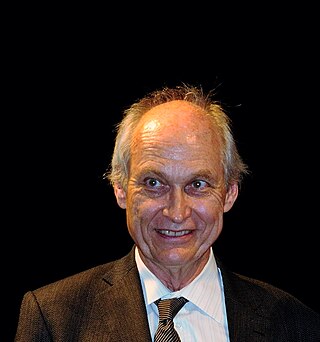
Michael S. Turner is an American theoretical cosmologist who coined the term dark energy in 1998. He is the Rauner Distinguished Service Professor Emeritus of Physics at the University of Chicago, having previously served as the Bruce V. & Diana M. Rauner Distinguished Service Professor, and as the assistant director for Mathematical and Physical Sciences for the US National Science Foundation.
Jeffrey Goldstone is a British theoretical physicist and an emeritus physics faculty member at the MIT Center for Theoretical Physics.
Mehran Kardar is an Iranian born physicist and professor of physics at the Massachusetts Institute of Technology (MIT), and co-faculty at the New England Complex Systems Institute (USA). He received his B.A. in physics from the University of Cambridge in 1979, and obtained his Ph.D. from MIT in 1983. Kardar is particularly known for the Kardar–Parisi–Zhang (KPZ) equation in theoretical physics, which has been named after him and collaborators. He was awarded a Guggenheim Fellowship in 2001.

Sankar Das Sarma is an India-born American theoretical condensed matter physicist, who has worked in the broad research topics of theoretical physics, condensed matter physics, statistical mechanics, quantum physics, and quantum information. He has been a member of the department of physics at University of Maryland, College Park since 1980.
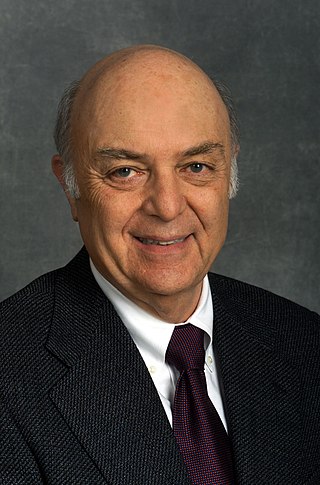
Marvin Lou Cohen is an American–Canadian theoretical physicist. He is a physics professor at the University of California, Berkeley. Cohen is a leading expert in the field of condensed matter physics. He is widely known for his seminal work on the electronic structure of solids.
David Pines was the founding director of the Institute for Complex Adaptive Matter (ICAM) and the International Institute for Complex Adaptive Matter (I2CAM), distinguished professor of physics, University of California, Davis, research professor of physics and professor emeritus of physics and electrical and computer engineering in the Center for Advanced Study, University of Illinois at Urbana–Champaign (UIUC), and a staff member in the office of the Materials, Physics, and Applications Division at the Los Alamos National Laboratory.

Peter Brent Littlewood is a British physicist and Professor of Physics at the University of Chicago. He was the 12th Director of Argonne National Laboratory. He previously headed the Cavendish Laboratory as well as the Theory of Condensed Matter group and the Theoretical Physics Research department at Bell Laboratories. Littlewood serves as the founding chair of the board of trustees of the Faraday Institution.

Michael Lawrence KleinNAS is Laura H. Carnell Professor of Science and director of the Institute for Computational Molecular Science in the college of science and technology at Temple University in Philadelphia, US. He was previously the Hepburn Professor of Physical Science in the Center for Molecular Modeling at the University of Pennsylvania. Currently, he serves as the dean of the college of science and technology and has since 2013.

David R. Nelson is an American physicist, and Arthur K. Solomon Professor of Biophysics, at Harvard University.
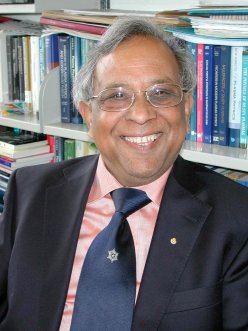
Padma Kant Shukla was a distinguished Professor and first International Chair of the Physics and Astronomy Department of Ruhr-University Bochum in Germany. He was also the director of the International Centre for Advanced Studies in Physical Sciences at Ruhr-University Bochum. He held a PhD in physics from Banaras Hindu University in Varanasi, India and a second doctorate in Theoretical Plasma Physics from Umeå University in Sweden.

Eugene Michael Chudnovsky is a Distinguished Professor of Physics at Herbert H. Lehman College of the City University of New York (CUNY) and a member of the doctoral faculty at the CUNY Graduate School. Chudnovsky is a Fellow of the American Physical Society (APS), elected 1993 for "seminal contributions to random ferromagnetism, macroscopic quantum tunneling, and hexatic order in high Tc materials". He is mostly known for his work on quantum tunneling of magnetization. Chudnovsky explained magnetic avalanches experimentally observed in molecular magnets as deflagration.
Christopher Sorensen is the Cortelyou-Rust University Distinguished Professor and a University Distinguished Teaching Scholar in the Kansas State University Physics Department. He also is an adjunct professor in the department of chemistry at Kansas State University. He was named the Carnegie Foundation and Council for Advancement and Support of Education United States Professor of the Year for doctoral and research universities in 2007. His research interests include materials synthesis including graphene materials, light scattering, particulate systems, and soft matter physics.
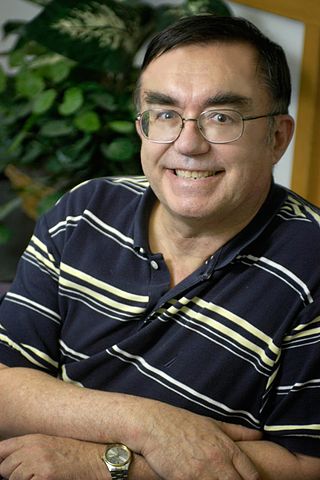
Geoffrey Charles Fox is a British-born American theoretical physicist and computer scientist, and professor of informatics and computing, and physics at Indiana University.
Anne-Christine Davis is a British theoretical physicist at the University of Cambridge. She was the first woman to be appointed a professor in the Faculty of Mathematics at the University. Her research mainly concerns cosmology, astrophysics and string theory.
Keith Alison Olive is a theoretical physicist, and director at the William I Fine Theoretical Physics Institute, University of Minnesota, specializing in particle physics and cosmology. His main topics of research are: big bang nucleosynthesis, which is an explanation of the origin of the light element isotopes through 7Li; particle dark matter; big bang baryogenesis, which is an explanation of the matter-antimatter asymmetry observed in nature; and inflation which is a theory constructed to resolve many outstanding problems in standard cosmology.
Bryan Ronald Webber, FRS, FInstP is a British physicist and academic. He was a Fellow of Emmanuel College, Cambridge from 1973 to 2010, and Professor of Theoretical Physics at the University of Cambridge from 1999 to 2010. He has been awarded the Dirac Medal by the Institute of Physics, the Sakurai Prize by the American Physical Society and the High Energy and Particle Physics Prize by the European Physical Society.
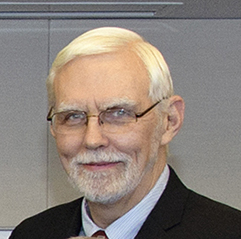
G. Peter Lepage is a Canadian American theoretical physicist and an academic administrator. He was the Harold Tanner Dean of the College of Arts and Sciences at Cornell University from 2003 to 2013.
Philip W. Phillips is a theoretical condensed matter physicist at the University of Illinois at Urbana–Champaign. He has contributed to the studies of various topics in modern physics including high temperature superconductivity and gauge–gravity duality.
Richard John Eden was a British theoretical physicist who researched quantum field theory, nuclear theory and S-matrix theory in the 1950s and 1960s.
Dmitry Garanin is a Russian-American physicist known for his work in theoretical condensed matter physics. He is a professor in the Department of Physics & Astronomy at Lehman College of The City University of New York and a faculty member in the physics department of the CUNY Graduate Center.









